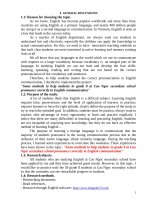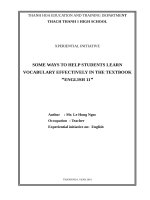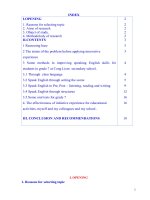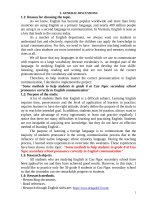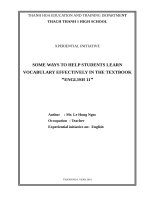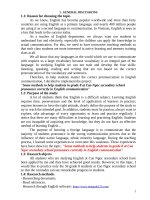SKKN the ways to help students in grade 6 study english vocabulary
Bạn đang xem bản rút gọn của tài liệu. Xem và tải ngay bản đầy đủ của tài liệu tại đây (515.9 KB, 24 trang )
THE TABLES OF CONTENTS
Orde
CONTENT
PAGE
r
1
2
3
4
5
6
7
8
9
10
14
15
16
17
18
19
Content
1.INTRODUCTION
1.1 Reasons for choosing the study
1.2 The aims of study
1.3 The subjects of study
1.4 The methods of study
2. CONTENT
2.1. Rationale of theory
2.2 The reality of the study
2.3 Problem solutions
2.4. The results in researching the reality
3.CONCLUSION AND RECOMMENDATIONS
3.1 Conclusion
3.2 Recommendations
REFFERENCES
NAMES OF EXPERIENCE INITATIVE
1
1
1
2
2
2
2
3
4
15
16
16
16
18
19
1. INTRODUCTION
1.1. Reasons for choosing the study.
We have witnessed the world with developing trends which
significantly extend diplomatic relationships among the nations and the
communicative language has become one of the most urgent demands in the
global. English has become an important communication tool for us to easily
integrate into the world. The teaching of English has been improved in
method of the communicative, leaner –centered approach which is adaptable
to give students many opportunities to communicate in English. Thus, a
question is given that how we have to teach English courses to meet the new
requirements in the industry and maintain indefinitely its importance which
has been recognized by society. Without doubt, this requires teachers to
constantly wide their own knowledge as well as create new teaching methods.
In fact, at many schools in Viet Nam, the teaching of English has not really
developed students’ ability, activeness and motivation. One of the problems is
how to effectively teach vocabulary, help students achieve their knowledge
and remember the English lessons intensively; therefore, the students have a
great opportunity to considerably improve their communication skills.
Therefore, I choose the theme “The ways to help students in Grade 6 study
English vocabulary” to present my personal experience.
1.2 The aims of study:
English has been learned everywhere recently. But how do the
students learn English and use English as a means of communication? There
is also the concern of industry and education of all teachers to teach English.
All four skills of listening, speaking, reading and writing are concerned
and have been incorporated into the exercises and classroom activities.
Having a great number of vocabulary helps students be good at four skills. We
cannot train and develop four skills, including Listening, Speaking, Reading
and Writing without basing on the foundation of vocabulary. Because of the
vocabulary’s extreme importance, creating the effective teaching method is an
essential requirement.
After several years of work, with many concerns and searching for
innovating teaching methods, I have increasingly awared that how to help
students learn and remember effectively a variety of glossaries is the most
essential thing we should do at first if we want our students to develop
2
perfectly all skills in English. I have studied and applied the experiences that
help Grade 6 students learn vocabulary well as follow.
1.3 The subjects of study.
After several teaching years, what I have realized is that a large
number of students are afraid of studying English and say that it is difficult
for them to be good at this subject because of a large number of vocabulary.
Moreover, there is not a real language environment for them to practice it
every day. In addition to this, the students lack of patience to achieve the
language. They only learn for the exam, not for the real life. Some teachers
also lack of putting real interest in their lessons. According to a recent survey,
more than 70% of the students reported that they are afraid of learning
vocabulary. They said that they only studied when having a force from the
teachers or parents. Because of these above situations, my theme tends to deal
with how to improve the efficiency of teaching vocabulary for students in my
secondary school through some personal experiences.
1.4. The methods of study.
- My real teaching at my school.
- Surveys
-Document research
- Discussion
2. THE CONTENT
2.1 Rationale of theory
Nowadays, English is playing an essential role in developing society as
well as economy of the world. People use it in work, study, and entertainment.
It is said that vocabulary plays an enormously important role in any languages
in the world because we use successfully languages thanks to vocabularies
which are basically formed on the group of words. Teaching and learning
foreign languages in all high schools aim to eventually communication, which
means that teachers are trained to coordinate all skills to students. However,
in order to practice regularly any specific skills, the first thing we need to do
3
is to equip students with a wide range of glossaries. We cannot train and
develop four skills, including Listening, Speaking, Reading and Writing
without basing on the foundation of vocabulary. Because of the vocabulary’s
extreme importance, creating the effective teaching method is an essential
requirement.
2.2 The reality of the study
The majority of Grade 6 students are deeply interested in learning
English and prepare books and supplies sufficiently. Most parents seem to be
particularly concerned and create conditions for their children to study.
Textbook in English 6 has many colorful pictures which help to increase
students' interest in the subject. A radio cassette is also prepared for the
subject with the aim at assess high chances to students to become familiar
with native speakers’ accent. I have had many extensive experiences in
teaching English 6.
However, Grade 6 is the first grade of secondary school, students are in for a
bit of surprise at learning many subjects in the general as well as English in
particular while the intellectual capacity many students is failing to meet the
requirements from courses. Differences in characteristics between English
and Vietnamese make students to adapt the subject slowly while many
students, especially boys, are often distracted and less fascinated in learning
both grammar and vocabulary.
The check or guide them to self-study at home sounds exceedingly difficult
because it can be clearly seen that not almost parents know English to teach
their children.
In addition, the measures students are applying for learning glossaries
are becoming fairly noticeable. Students often learn vocabulary by reading
words in English and try to remember them in Vietnamese. It is rote learning,
which means that anything they can write in writing is also to deal with the
teacher, but not self-consciously check themselves. The students cannot
remember vocabulary in a sustainable manner if they follow this method
4
because there is a wide range of words in each lesson every day, which
contributes to their knowledge gaps, makes them bored with subjects and
leads to their weak academic performance
I made a survey to find out the ability to remember in class 6A1, 6A2
According to the survey, I gained the following results:
class Ss
6A1
6A2
40
28
good
fair
SL
5
12.5
2
7.1
SL
7
5
mediu
%
17.5
17.9
SL
10
6
%
25
21.5
poor
SL
10
8
fail
%
25
28.5
SL
8
7
%
20
25
2.3 Problem solutions
2.3.1. Some principles in teaching vocabulary
To make possible the introduction of new requirements in place, we need to
distinguish between two basic concepts: semantic meaning and usage.
The meaning of a word and how to use them are two distinctly different
concepts. For instance, there are some cases in which students can look up
new words in the dictionary and understand their meaning easily without
knowing to use them. Usage of a word depends very much on the context, the
habits of native speakers and the relationship in the cultural environment and
their society. Usage can only be understood when they are introduced in the
context or situation where native speakers use.
a.Choose words to teach:
New words always appear in each lesson with different teaching methods. We
need to consider two concepts so that we can choose words for teaching:
active vocabulary and passive vocabulary.
- Active vocabulary is words students understand, recognize and use in
communication and writing.
- Passive vocabulary is words students only perceived when listening and
reading
There is a fundamental distinction in terms of teaching and introduction
between two these kinds. Active vocabulary is related integrally to four basic
skills: Listening, Speaking, Reading and Writing, which illustrates that it
takes much time to introduce to students and practice more. Regarding of
5
passive vocabulary, students might be required to understand words – stop at
the level of awareness and practical exercises are not really necessary. In each
lesson, teachers should choose and decide which one belongs to active group
or passive group. The number of words taught in all lessons depends on the
content and level of the student. It is highly suggested that teachers should not
always teach all new words in each lesson since we also need time to perform
other activities. However, it is the best idea that students should be taught a
maximum of 8 words in one lesson.
b. These factors should be clarified when introducing vocabulary
It is normally required that the teachers must specify three basic elements of
the language when introducing new information to their students:
form,
meaning and usage. These factors are concretized through the steps as
follows:
- Phonetics / Pronunciation
- Lexical meaning
- Spelling
- Grammartical form
- Usage
c.The key steps to teach vocabulary:
- 1st step: Presentation
- 2nd step: Checking
- 3rd step: Practicing
2.3.2 The teaching tips in the introduction new words
Teachers can use some tips suggested to introduce new words, which help
students learn gain knowledge actively, as follow:
a. Visual
It is said that students learn new words quickly thanks to pictures their
teachers can show clearly to them.
Example:
6
When teaching about the school things in Unit 1. My new school , we have
some vocabulary: compass, calculator, rubber, these pictures were shown so
as to elicit the meaning of the word and my students could easily find out that
the meaning of the word was.
b. Mine
Example: Unit 6. Our Tet holiday – A closer lok 2
This lesson tells students about different actions. To introduce the words in
topic
actions people should or shouldn’t do such as “climb, cheat,” ...
teachers can use body gestures or facial and ask students to guess the meaning
of the word
c. Realia (Using visual aids)
Example: Unit 1 My new school - Getting started
To introduce things related to school stationery as ruler, pen, book ... we can
point at these things on the students’ tables because they use them every day.
d. Situation / Explanation:
The teachers can use situations and clear explanation which help students
learn new words effectively.
7
For example, to introduce the word " firework" in Unit 6. A closer look 1, we
explain that this word is associated with many words such as Tet
holiday,Chung cake, envelop…
e. Example
We provide with students to specific examples related to the upcoming topic
or lessons, which grow great curiosity and exert strong attraction to them.
Example: To introduce words related to wonders in Unit 5, we have some
words: waterfall, mountain, forest…
f. Synonym / antonym
Teachers use words that were taught before and equal or opposite to words in
next lesson to help students understand the meaning of those words.
For example: Unit 4. Our neighberhood
After finishing introduction of "narrow", we could say "wide" is antonym of
“narrow” they have learned. Therefore, the students can understand meaning
of "narrow” in Vietnamese.
g.Translation
- Teachers use words having the same meaning in Vietnamese to provide
meaning in the English.
- This tip is particularly applied to teach the abstract. Moreover, in case
that there is a limitation time and a large range of words but, teachers are
strongly suggested this tip to translate the words to their students.
Example: Unit 4. A closer look 1, we have the word "terrible" or the word
"fantastic".
2.3.3 The methods to test and reinforce vocabulary:
a. The measures for checking new words following theoretical teaching
methods
It is an undeniable fact that just introducing new words is not really enough.
We also have to take some steps to check and reinforce new vocabulary
immediately in class. The test procedure and consolidation will encourage
students to learn actively and efficiently
8
CHECKING TECHNIQUES FOR VOCABULARY
* Rub out and remember:
1-Teacher presents or elicits the vocabulary and build up the list on the
blackboard.
2- After each word teacher put the Vietnamese translation.
3- Teacher the students to copy into their books and then close their books
4- Teacher rubs out the new word one at a time.
5-Eacher time teacher rub out a word in English, point to the
Vietnamese translation and ask “What’s this in Vietnamese?”
6- When all the English words are rubbed out teacher go through the
Vietnamese list and get the students to call out the English words
7- If there is time, the teacher will get the students to come to the black
board and write the English words again
*Note: It helps learners to memories new vocabulary.
Example: English 6-Unit 5 –Lesson 1
1-…………..: kì nghỉ
5-………….: điểm đến
2-………….: thành cổ
6-…………..: thăm
3-………….. : vịnh
7-…………...: bãi biển
4-…………..: ở
*- Slap the board:
1-Teacher puts the new words in English on the black board in bubbles –not
in a list
2- If you want to check the understanding, put the Vietnamese translation of
the new words or picture on the blackboard.
3-Teacher divides the class in to two teams of five or six to front of the class.
9
4- Teacher chooses a student from each team and they stand at equal distance
from the blackboard.
5- Teacher calls out one of the new word in a low voice in Vietnamese
6- Two students must run forward and slap a word the word in English on the
board.
7- The one who slaps the correct word first is the winner. If students are
playing in teams ,the win team gets a mark.
8- Then teacher ask two more students to come forward …..etc.
* Note: There are two points to remember in S the B. If you use only
English , learners are only recognizing the word in through listening.
However if you use Vietnamese translation or picture you can check the
meaning of the new vocabulary.
Example: Unit 6. Getting started
Checking vocabulary: slap the board
*What and where:
1- Teacher writes the new words in the circles on the black board not in a list.
2- When all the words are on the board, teacher ask the students to repeat the
words in circles.
3- Teacher rubbed out one of the words but doesn’t rub out the circles.
4- Teacher gets the students to repeat the words including the rubbed out
words by pointing at the empty circles.
5- Teacher rubs out another word but leaves the circles.
6- Teacher point the word or empty circles, students read and have to
remember all the words.
7 - Continues till the cycles are empty.
8 - Techer ask the students (6 or 8 at the time 0 to come to bb and fill in the
circles with the correct words.
10
* Note: This check technique is good for learners to remember the new
words and also good for revision of vocabulary.
* Matching:
1 - The teacher writes the new words in the list on the left hand side of the bb.
2 - The teacher writes the definitions, translation or draws pictures on the
right hand side of the board.
3 - The teacher asks the students to come to the broad match the items on the
left with those on the right by drawing a line between them.
*. Jumbled words:
1-The teacher sticks 6 flashcards with jumbled words on the bb
2-T-asks Ss to rewrite the words in the right order
3-The teacher tells students that the first two groups with the right word will
get two points
4 -The teacher corrects them.
5 - The teacher asks students to read again
Example: Unit 5. Getting started
*- Answer keys:
1-desert
3-forest
5- waterfall
2-mountain
4- beach
6-river
*- Note: This checking
F- Bingo:1- Teacher draw technique helps students remember deeply the
words they have leant.box on board and asks students to copy.
2-Teacher asks students to rewrite 6 new words they have learnt in the box.
Example:
desert
11
mountain
beach
waterfall
forest
river
3- Teacher tells students that she/ he will say some words (8-10-12-15)
4- If students hear the word, they cross it out .
After limited time, who has most word say Bingo
b. Review vocabulary through some games
In addition to the familiar tips which have been mentioned above, I have
studied and applied some following interesting games in many lessons with
the aim at making the lessons more extremely attractive and helping students
memorize vocabulary quickly and more efficient.
* Remember my name
- The teacher divides the class into 2 teams and then invite about 3 to 5
students who are representatives of the two teams (depending on the amount
of new words each lesson) to stand up before class.
- Each student himself will play as a character by using the word they have
learnt.
Example:
Group 1
Group 2
S1: I am a chair
S1: I am a lamp
S2: I am a table
S2: I am a bookshelf
S3: I am a television
S3: I am acouch
- After their introduction completely finishes, in turn, the two teams determine
the name of the opposing team by pointing at them and say:
- You are a chair.
- ..........
Or the teacher gives questions and asks students answer:
Teacher: What is her / his name?
Student: She / He is a chair.
....................................... ..
12
With each correct answer, the student will be given 10 points
Finish the game, the team that has more points wins
*Catching Ball
- The teacher divides the class into 2 teams
- The teacher prepares a toy ball and ask students to memorize new words
they have learnt
- The teacher hit the ball into a student and read loudly Vietnamese meaning or
an English word. When any student in class catches the ball, she / he will have
to repeat an English word which is similar to Vietnamese word the teacher has
read before. The student will gain 10 points with each correct answer.
Finish the game, the team that has more points wins
* Transformation:
- The teacher divides the class into 2 teams in two rows of students’ desks
- The teacher whispers to the student at the first table of each row
- Students listen carefully words their teacher said. In the allowed time, these
students quickly whispered into your ear next and take turn to last student.
- Finish the game, team correct pronunciation quickly words the teacher said
at the beginning will be the winner.
With this game, I often use to check students with one or two new difficult
words in the lesson. By this way, students are extremely excited and highly
concentrated on teacher’s teaching, which make difficult glossaries in lessons
also become quite easy.
* Simon saids
* - Teachers shouted imperativeness along with “Simon said” and students
must follow.
Example: If the teacher says "Simon said: stand up" students will have to
stand up, if the teacher says "Simon said: touch your head" students will be
touched in the head. If the teacher just said, "stand up" or "touch your head",
the students do not follow this order.
13
- Teachers may organize games in small groups. The group that makes less
mistakes becomes be winner.
The teacher can review the words in Warm –up part of the new lesson.
Warm-up plays an important part in the success of the lesson and also helps
students remember the words. Teachers should vary warm-up activities to
attract students' attention and interest because if they feel excited about their
lessons from the beginning, they will make a good contribution to it. In order
to give students exciting readiness for their new lesson, teachers can do
different things to arouse students’ interest by using various teaching
techniques such as brainstorming, word web, chatting, etc.
Before a new lesson I often motivate my students by chatting to them about
the topic of interest, giving them preparation tasks or quick warm-up to get
them in the right mood for the new lesson. Brainstorming is one of the
simplest teaching techniques, but it is one of the most effective kinds of
motivation because it takes a short time. I can write key words on the
blackboard and the class is encouraged to think of ideas, words, phrases
associated with them.
I have taught my grade 6 students English as a selective subject since the
beginning of this school year. The following slide was designed on my power
point lesson plan for one speaking lesson (Grade 6 selective subject).
My students were divided into two teams. The first team tried to put as
many natural wonders as they could around the key word “Natural wonders”
and the second team tried to find the words for the key word “items for
holiday”. When the time allowed was over, the team with more correct words
was the winner. Students have an opportunity to revise the vocabulary.
14
The possible answer key for the warm-up activity
For Unit 6. Our Tet Holiday, I used the technique “word web” in order to
warm up the new lesson. This activity could help my students revise the Tet
holiday preparation verb they had learned and could help them get ready for
the new lesson with more interest.
The possible answer key for the warm-up activity
To confirm the importance of teaching vocabulary, I have conducted some
studies as follow:
- Observing colleagues’ teaching period and gain experiences from them
15
- Educate the students about the importance of vocabulary
- Examining each lesson carefully to choose the most optimal teaching
method before class; Being serious and often using the tips, the games in the
process of teaching vocabulary
- Teaching in different grades
- Creating a new habit to students, which enhance students to learn new words
in the best way.
- Guiding students to learn glossaries at home
- Checking if the student remember new words and use them correctly or not.
It appears that the students have no time to learn new words at school owing
to limited time, they are encouraged to self-study at home. Thus, at the
beginning of the school year, teachers should guide students to build learning
activities at home effectively. If this is done well, then the teaching and
learning activities will increasingly improve.
2.4. The results in researching the reality
After a period of time of conducting these solutions, to my expectation,
I have gained satisfying results. I've found that my students have become
more confident and active in studying vocabulary. Many of them said that
they no longer feel their vocabulary lessons stressful and too difficult. Most
of them admitted that their number of vocabulary has been improved a lot
day by day.
I have gained the below results
class Ss
6A1
6A2
40
28
good
SL
15
10
mediu
fair
%
37.5
35.7
SL
18
12
%
45
42.9
SL
7
5
%
17.5
17.9
poor
SL
0
1
fail
%
0
3.5
SL
0
0
%
0
0
3. CONCLUSION AND RECOMMENDATIONS:
3.1.Conclusion:
16
Applying thoroughly the tips above into the teaching process helps me
find that students had marked progress and noticeably improved in
pronunciation, remembering and using vocabulary. It is the fact that they no
longer feel awkward or difficult to learn new words. In contrast, they are very
excited about each lesson, ready to be tested knowledge which was taught in
the previous lesson and start feeling reluctant to perform the communicative
activities. It seems easier to the students to read and understand the
requirements of assignments, texts as well as use words to put sentences or
write a short paragraph. Thus it is highly confirmed and suggested that the
adoption of new tips to teach new words is the method that each teacher
should constantly study and apply in the teaching process. This not only
makes students more interested in learning vocabulary but also contributes
greatly to improving the quality of teaching and learning in general, the
quality of English at schools in particular. And remember the English
proverb: “If at first you don’t succeed, try, try again”.
3.2. Recommendations:
+ Recommendations to THE EDUCATION AND TRAINING
COMMITTEE DIVISION and my school:
- I recommend that THE EDUCATION AND TRAINING COMMITTEE
DIVISION hold more sample teaching lessons, using various useful teaching
techniques in an artistic way in order to attract students’ enthusiasm in
studying tasks.
-I suggest that THE MANAGING BOARD of my school buy more and more
materials of methodology for the teachers of the school. As a result, the
teachers should have a better chance to develop their job.
+ Recommendations to other teachers:
- Indeed, I know that I am not really full of experience in teaching because
the number of years I have involved in this job is still far smaller than many
of my colleagues. Therefore, I would need useful comments and supplements
from experienced teachers so that my initiative ideas would be much better.
17
Sincerely!
Cam Thuy, May 18th 2021
THE HEADMASTER’S
IDENTIFICATION
Headmaster
Nguyễn Thị Thủy
I certify that the minor thesis entitled
“ The ways to help students in Grade
6 study English vocabulary” is the
result of my own work and that the
minor thesis or any part of the
samehas not been submitted to any
university or institution
The Author
Trịnh Thị Hạnh
REFFERENCES :
- websites:
› Tài Liệu Phổ Thông › Sáng kiến kinh nghiệm
/>sangkienkinhnghiem.org
/>
18
NAMES OF EXPERIENCE INITATIVE RECOGNISED BY
DIVISION AND DEPARTMENT OF TRAINING AND
EDUCATION
TT
NAMES OF EXPERIENCE
RECOGNISED BY
RESULTS
Pair work – group work
Cam Thuy
B
2012- 2013
in teaching English
division of
B
2015- 2016
B
2018-2019
YEAR
INITATIVE
1
training and
2
Using songs in teaching
education
Cam Thuy
English
division of
training and
3
The ways to motivate
education
Cam Thuy
19
students in practicing
division of
speaking English
training and
education
ĐÁNH GIÁ, XẾP LOẠI SKKN CỦA HỘI ĐỒNG KHOA HỌC,
SÁNG KIẾN NHÀ TRƯỜNG
.............................................................................................................................
.............................................................................................................................
.............................................................................................................................
.............................................................................................................................
.............................................................................................................................
.............................................................................................................................
Xếp loại:............................................................................................
TM. HỘI ĐỒNG KHOA HỌC NHÀ TRƯỜNG
Chủ tịch
Nguyễn Thị Thủy
20
21
ĐÁNH GIÁ, XẾP LOẠI SKKN CỦA HỘI ĐỒNG KHOA HỌC, SÁNG
KIẾN PHÒNG GIÁO DỤC VÀ ĐÀO TẠO HUYỆN CẨM THỦY
Sáng kiến kinh nghiệm tiêu biểu
Xếp loại:
B
TM. HỘI ĐỒNG KHOA HỌC PHÒNG GD&ĐT
Chủ tịch
Nguyễn Thanh Sơn
22
ĐÁNH GIÁ, XẾP LOẠI SKKN CỦA HỘI ĐỒNG KHOA HỌC,
SÁNG KIẾN SỞ GIÁO DỤC VÀ ĐÀO TẠO TỈNH THANH HÓA
.............................................................................................................................
.............................................................................................................................
.............................................................................................................................
.............................................................................................................................
.............................................................................................................................
.............................................................................................................................
Xếp loại:............................................................................................
TM. HỘI ĐỒNG KHOA HỌC SỞ GD&ĐT
Chủ tịch
23
THANH HOA DEPARTMENT OF EDUCATION AND TRAINING
CAM THUY DIVISION OF EDUCATION AND TRAINING
EXPERIENCE INITIATIVE
THE WAYS TO HELP STUDENTS IN GRADE 6
STUDY ENGLISH VOCABULARY
The implementation: Trịnh Thị Hạnh
Job title: Teacher
School address: Cam Thuy Town junior high school
Experience of subject: English
THANH HOA, THE YEAR 2021
24

